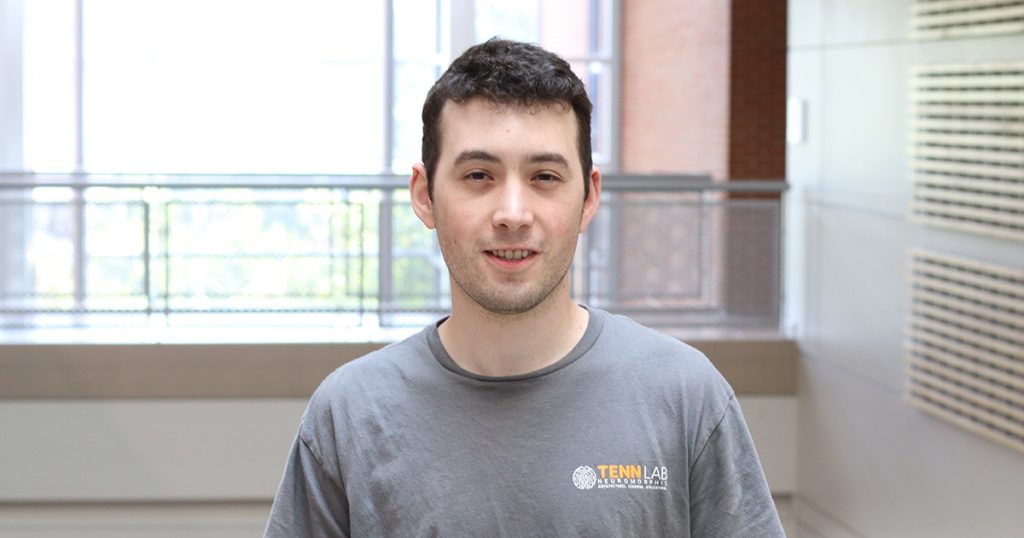Daniel Mallett graduated from Miami University in 2019 with a bachelor’s degree in mechanical engineering. He worked for nearly two years as a project manager before realizing his appetite for learning wasn’t fully satiated.
Mallett wanted to pursue a degree in computer science and apply his knowledge of programming and engineering to solving complex problems. He enrolled at the University of Tennessee in 2022, discovering a wealth of resources to feed his passion.
Mallett has been working as an undergraduate research assistant in the TENNLab–Neuromorphic Architectures, Learning, Applications. The senior is conducting cutting-edge research on brain-inspired artificial intelligence as an assistant for James Plank, a professor in the Min H. Kao Department of Electrical Engineering and Computer Science.
“Neuromorphic computing is a relatively new area of research, so it’s really exciting to be a part of it, especially when there have been such huge leaps in AI and machine learning,” Mallett said. “I would love to continue doing research and possibly pursue it further in graduate school and as a career.”
Neural Networks Spike His Interest
The goal of the TENNLab is to design computing systems using principles of the biological brain. The professors and students view computing components like neurons and synapses and compose them into networks that solve various computational tasks with high speed and low power.
“A lot of it is really exploring how neuromorphic computers work,” Mallett said. “A big thing in artificial intelligence right now is deep learning. They use a type of neural network called an artificial neural network. Neuromorphic computers are very similar to that, but it’s a different type of neural network called a spiking neural network.”
Mallett has been evaluating the performance of spiking neural networks being trained with EONS (Evolutionary Optimization for Neuromorphic Systems), a tool for training spiking neural networks with machine learning. Specifically, Mallett has been using EONS to train networks for computer vision tasks like image classification. He’s been taking data from a new type of camera sensor called a dynamic vision sensor and training SNNs to classify different geometric shapes with EONS.

“It’s analogous to evolution and biology,” Mallett said. “You have a population of these spiking neural networks; you test them and assign them a fitness score. Then, it’s survival of the fittest, where you continue training the best performing networks and produce new networks for them.”
Mallett’s work is collaborative with other students in the lab. Each works on separate but related projects. If someone writes a program for one project, it can often be adapted or reused for other research efforts.
“We all kind of have our own skill set that we’ve developed, and we can help each other out,” Mallett said. “I am always leaning over and asking if they can help on things they worked on last week if I am struggling with it.”
Plank has been impressed with Mallett’s eagerness to tackle multiple projects in the lab and his quiet confidence.
“He’s always ready to jump in and help with anything we ask,” Plank said. “Our team at TENNLab is like a family, and our undergrad researchers are some of the best of the best. It’s a great path to take and I have really enjoyed working with Daniel and the other students.”
Helping the Next Generation of UT Students
Since enrolling at UT, Mallett has seen how much value undergraduate research provides to students.
“It’s huge for learning and getting experience. I don’t think that classes always impress on students the need for problem solving and how much learning comes along with that,” Mallett said. “It’s great having a real-world problem that you are trying to solve. It’s a lot more open ended.”

Mallett does his own coding at home. He worked at the UT Tower for a few years on some of the websites and web apps for the UT System and it sparked his interest in web development. He created an AI Pomodoro timer to help track how much time is spent on specific tasks.
“I like to find some cool idea or project to work on and just run with that in my free time,” said Mallett, who volunteered as a puppy raiser while at Miami University to help train service dogs to enrich the lives of children and veterans with disabilities.
Throughout his undergraduate research in the TENNLab, Mallett has been working on existing software frameworks previous students have utilized. Like his predecessors, he wants to leave his own mark for the next generation of UT students.
“I’m hoping that my work has the ability to outlive my time with the lab,” Mallett said. “I hope they can continue to use the software I’ve written to advance research on neuromorphic computing.”
Contact
Rhiannon Potkey (865-974-0683, rpotkey@utk.edu)
